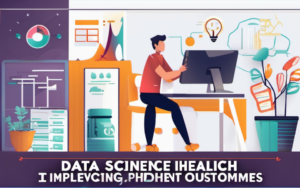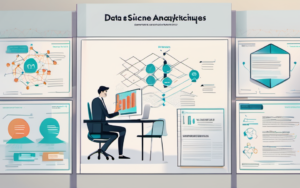The world of business is undergoing a dramatic transformation, fueled by the power of Data Science. This revolutionary field is no longer a niche domain but a core driver of market trends, shaping the way businesses operate, interact with consumers, and navigate the competitive landscape.
Data Science: The New Market Trendsetter
The rise of big data has created a wealth of information that can be leveraged to gain valuable insights. Businesses are realizing that making informed decisions based on data is no longer a luxury but a necessity for survival.
The Rise of Data-Driven Decision Making
Data science empowers businesses to move beyond gut feeling and intuition by providing data-driven insights that illuminate the complexities of the market. This shift towards data-driven decision making is evident across industries, from retail and finance to healthcare and manufacturing. By analyzing historical data, identifying patterns, and predicting future trends, businesses can make more informed decisions, optimize their strategies, and gain a competitive edge.
Data Science: A Catalyst for Market Transformation
Data Science isn’t just about analyzing data; it’s about transforming data into actionable insights. It enables businesses to understand customer behavior, identify market opportunities, and develop innovative products and services that resonate with consumers. This transformative power of data science is driving market evolution, creating new opportunities and reshaping established industries.
Unveiling Market Trends Through Data Analysis
Data science offers a powerful toolkit for uncovering hidden trends and patterns within vast datasets. These insights can be used to understand consumer behavior, predict market shifts, and make strategic decisions that drive growth.
Predictive Analytics: Forecasting Market Behavior
Predictive analytics, a core component of data science, utilizes statistical models and machine learning algorithms to forecast future market trends. By analyzing historical data and identifying patterns, businesses can anticipate demand fluctuations, predict customer behavior, and forecast the success of new products or services. This allows them to proactively adapt their strategies and stay ahead of the curve.
Customer Segmentation: Targeting the Right Audience
Data Science enables businesses to segment their customer base into distinct groups based on demographics, behavior, and other relevant factors. This granular understanding of customer profiles allows for targeted marketing campaigns, personalized recommendations, and more effective product development. By focusing on the specific needs and preferences of each customer segment, businesses can maximize their marketing ROI and build stronger customer relationships.
Sentiment Analysis: Understanding Consumer Opinions
Sentiment analysis, a technique used to analyze text data and extract sentiment, provides valuable insights into consumer opinions and attitudes. By monitoring social media conversations, customer reviews, and other online sources, businesses can understand how their brand is perceived, identify areas for improvement, and tailor their messaging to resonate with their target audience. This real-time feedback loop allows businesses to be more responsive to customer needs and adapt their strategies accordingly.
Real-World Applications of Data Science in Market Trends
The application of Data Science in market trend analysis extends beyond theoretical concepts and into real-world scenarios. Businesses are leveraging data science to optimize their operations, improve customer experiences, and gain a competitive advantage.
Personalized Marketing: Tailoring Experiences to Individuals
Data science empowers businesses to personalize marketing campaigns and customer experiences based on individual preferences and behaviors. By leveraging data about customer demographics, purchase history, and online activity, businesses can deliver targeted messages, personalized recommendations, and tailored promotions. This personalized approach leads to increased engagement, higher conversion rates, and stronger customer loyalty.
Dynamic Pricing: Optimizing Prices Based on Demand
Dynamic pricing, a strategy powered by data science, enables businesses to adjust prices in real-time based on factors such as demand, competition, and time of day. By analyzing historical data and incorporating real-time information, businesses can optimize their pricing strategies, maximize revenue, and ensure price competitiveness.
Supply Chain Optimization: Streamlining Operations
Data Science plays a vital role in supply chain optimization by analyzing data from various sources, including inventory levels, supplier performance, and customer demand. By leveraging these insights, businesses can optimize inventory management, improve logistics efficiency, and minimize disruptions to their supply chain. This results in cost savings, improved delivery times, and increased customer satisfaction.
The Future of Data Science in Market Trends
The future of data science in market trends is bright, with ongoing advancements in artificial intelligence (AI) and machine learning (ML) pushing the boundaries of what’s possible.
Artificial Intelligence and Machine Learning
AI and ML are transforming the way businesses analyze data, leading to more accurate predictions, automated decision-making, and greater efficiency. These technologies can identify complex patterns, optimize marketing campaigns, and personalize customer experiences at a scale previously unimaginable.
The Importance of Data Ethics and Privacy
As data science becomes more pervasive, it’s crucial to address ethical considerations and ensure data privacy. Businesses must prioritize responsible data collection, use, and storage practices. This includes obtaining informed consent, protecting sensitive information, and adhering to relevant regulations.
Data Science: A Key Driver of Innovation and Growth
Data Science is not just a trend; it’s a fundamental shift in how businesses operate. As data becomes increasingly valuable, businesses that embrace data-driven decision making will be well-positioned to innovate, grow, and thrive in the competitive market.
Embracing the Data-Driven Future
The power of Data Science to shape market trends is undeniable. By leveraging the insights gleaned from data, businesses can gain a competitive edge, improve customer experiences, and drive innovation. The future of business lies in embracing the data-driven approach, harnessing the transformative power of data science to navigate the dynamic market landscape and achieve sustainable growth.




